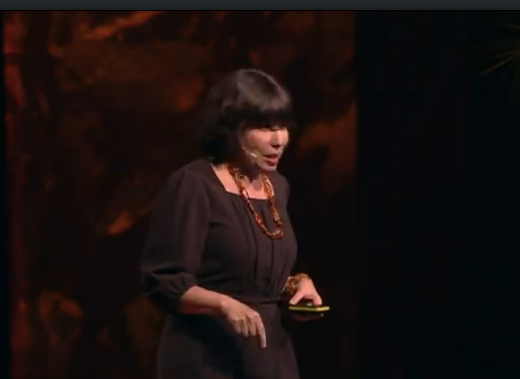What is going on in this baby's mind? If you'd asked people this 30 years ago,
這位寶寶在想什么?如果你在30年前問這個問題,
most people, including psychologists, would have said that this baby was irrational, illogical, egocentric --
大多數人,包括心理學家,會告訴你這個小孩沒有理性的,沒邏輯,以自我為中心——
that he couldn't take the perspective of another person or understand cause and effect.
他不會站在他人的角度思考,或者不明白因果關系。
In the last 20 years, developmental science has completely overturned that picture.
在過去的20年里,發育學徹底地顛覆了這個觀念。
So in some ways, we think that this baby's thinking is like the thinking of the most brilliant scientists.
從某些角度來看,這個寶寶的思維和大多數聰明的科學家的思維相同。
Let me give you just one example of this. One thing that this baby could be thinking about,
我可以舉個這樣的例子。這位寶寶可能在思考某件事,
that could be going on in his mind, is trying to figure out what's going on in the mind of that other baby.
在他的腦袋瓜中,他想要弄清楚其他嬰兒在想些什么。
After all, one of the things that's hardest for all of us to do is to figure out what other people are thinking and feeling.
畢竟,我們最難辦到的一件事是理解他人的想法和感覺。
And maybe the hardest thing of all is to figure out that what other people think and feel isn't actually exactly like what we think and feel.
而最難辦到的事是理解他人的想法和感覺和我們自己的不完全一致。
Anyone who's followed politics can testify to how hard that is for some people to get.
任何追尋過政治的都可以證明了解他人的想法是多么困難。
We wanted to know if babies and young children could understand this really profound thing about other people.
我們想要知道寶寶和小孩子能否理解其他人的奧秘。
Now the question is: How could we ask them? Babies, after all, can't talk,
目前的問題是: 我們如何與寶寶們溝通呢?他們還不會說話,
and if you ask a three year-old to tell you what he thinks, what you'll get is a beautiful stream of consciousness monologue about ponies and birthdays and things like that.
當你問一個三歲的小孩,他在想什么時,他的回答將會是一串精彩的意識流獨白,關于小型木馬,生日,或是類似的答案。

So how do we actually ask them the question?
那我們應該如何向他們提問呢?
Well it turns out that the secret was broccoli. What we did -- Betty Rapacholi, who was one of my students, and I -- was actually to give the babies two bowls of food:
秘密居然是花椰菜。我們用的方法是——我的一個學生,貝蒂拉帕求利和我給了這些寶寶們兩碗食物:
one bowl of raw broccoli and one bowl of delicious goldfish crackers.
一碗生的花椰菜,一碗是好吃的金魚餅干。
Now all of the babies, even in Berkley, like the crackers and don't like the raw broccoli.
所有的寶寶,包括在柏克萊的那些,選擇了餅干而不是生的花椰菜。
But then what Betty did was to take a little taste of food from each bowl.
但是貝蒂隨后品嘗了這兩種食物。
And she would act as if she liked it or she didn't. So half the time, she acted as if she liked the crackers and didn't like the broccoli -- just like a baby and any other sane person.
然后作出了喜歡或不喜歡的表情。有一半的情況,她的反應和寶寶還有正常人一樣——喜歡餅干而不喜歡花椰菜的表情。
But half the time, what she would do is take a little bit of the broccoli and go, "Mmmmm, broccoli. I tasted the broccoli. Mmmmm."
但另一半情況,她是吃一點花椰菜 然后說:"Mmmmm,花椰菜。我吃了花椰菜。"
And then she would take a little bit of the crackers, and she'd go, "Eww, yuck, crackers. I tasted the crackers. Eww, yuck."
然后當她吃到餅干的時候,她說:"餅干真難吃。我居然吃了餅干。真惡心。"
So she'd act as if what she wanted was just the opposite of what the babies wanted.
所以她假裝自己喜歡吃的和寶寶們喜歡的恰恰相反。
We did this with 15 and 18 month-old babies. And then she would simply put her hand out and say, "Can you give me some?"
我們對15個月和18個月大的寶寶們做了這個實驗。貝蒂將自己的手伸出說 “能給我點嗎?"











